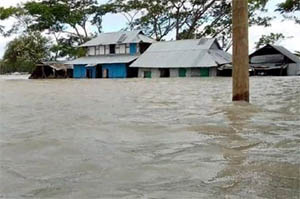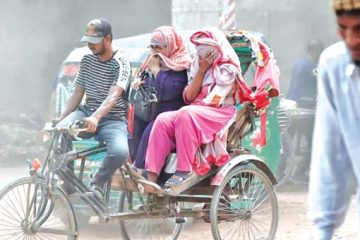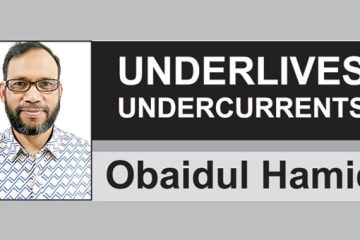Views
Ashish Barua, Sawkat Chowdhury
The Sixth Assessment Report (AR6) by Working Group I of the Intergovernmental Panel on Climate Change (IPCC) shows that the sea level, over the last 120 years, has increased by 0.20 metres, and continues rising fast, caused by thermal expansion, glacier ice loss, ice sheet loss, etc. The sea level rise in Bangladesh estimated using gauge data shows varying in different parts of the coastal zone, while the coastal areas along the Sundarbans are highly vulnerable.
A higher level of tides during full moon and new moon has become a regular phenomenon in the coastal districts in Bangladesh – mainly in Khulna, Bagerhat, Satkhira, Patuakhali and Barguna – over the last couple of years. This is impacting climate-vulnerable communities at scale and in multiple sectors. During the full moon in July and August in 2022, hundreds of villages were flooded twice daily, at least for a week in each round. It resulted in economic and non-economic losses and damages with both short- and long-term impacts.
Kamala Begum from Uttar Sutalori village in Bagerhat’s Morrelganj upazila was surprised at the level of the tide. “I got my new house last year as support from an NGO as my old land and house were lost to river erosion. Now my new house is also inundated, and it was built high,” she said.
In both the months, the community was almost waterlogged for around seven days. They could hardly cook at home, and dry food items were not available either as the local markets were shut down; only the households owning boats could manage their food from faraway markets. Daily wage earners remained jobless, and the fisherfolk could not go outside for regular fishing. Sufia Khatun, a 42-year-old woman from West Baharbuniya village in the same upazila said the tidal surge was waist-high, breaching the road that connects the community to the upazila, which also acts as an embankment for Paanguchi River that flows near Baharbuniya.
Because of the continuous tidal flow for around a week, the seedbeds for Aman paddy were inundated. Farmers have no hope of recovering the seedlings, so they need to make the beds again, which leads to additional seed, fertiliser, and cultivation costs. Those who cannot afford these additional costs will have to purchase seedlings at a higher price later. “There is no support to cover this type of loss; no one even talks about it. This has been our fate. If we can manage ourselves, then it is fine. Nonetheless, we remain in hunger. But who cares?’ said Khalil, one of the farmers who lost his Aman seedbed to the tidal surge.
The standing water damaged the vegetables, resulting in lower household food consumption and income for a couple of months. Vegetables that are not water-tolerant were almost lost. They had to root many plants prematurely, and ate whatever was not saleable in the market. This loss of food and income is irreparable, as they cannot reproduce some of the vegetables at the end of the monsoon. On the other hand, July, the driest month in the last 42 years in Bangladesh, had minimal potential to reproduce the crops. This has impacted the overall earnings of families in the community, impacting their food intake and access to other essential commodities.
The fish-farming ponds were inundated, and the owners lost almost all their production. Those who are not financially capable of recovering from this loss are at risk of falling into the vicious cycle of loans, loss of assets, and migration in the short run.
Abdus Sabur leased a pond with three others for shrimp farming using a loan from a local NGO. Their entire shrimp production got washed away during the high tide, and they have no way of recovering from the losses. They don’t know how they will repay their loan and manage their families’ daily expenses in the coming days.
Most importantly, the damage to the roads is not getting noticed either by the government or the development agencies, said Esken Khan, member of the union parishad for this area and the panel chairman. The road construction has been a long-demanded and long-awaited project, but there is no action. Hence, they hardly expect any repair and maintenance work for the damages.
The spectrum of loss and damage also includes non-economic factors. Most of the schools there remain closed (unofficially) during heavy rainfall as the students can’t go to school due to the poor conditions of the roads. As the roads were inundated during the last high tidal flow, most students could not go to school. “When I was on my way to school on July 10, there was water on the road almost up to my knee. But the point near the market was damaged, the water was deeper there, I was trying to cross, but I slipped. I couldn’t go to school for the whole week because the road remained under water,” said Lamia, a sixth grader in the area.
The infrastructural damage is usually counted as a part of economic losses and damages, while the list of non-economic losses and damages is too long. These include the immediate health impact of drinking unsafe water from open sources, having limited to no access to sanitation facilities, and menstrual hygiene mismanagement for adolescent girls and women of reproductive age. The saline intrusion in the minimal sweet water sources because of this high tidal flow has been a grave concern that will take a long time to recover, especially since there has been very little rain this year.
There are many more sectors to explore where people often lose their income and livelihood opportunities. People living in the climate-vulnerable areas are already experiencing massive losses and damages because of the intense and frequent cyclones, tidal surges, and floods, which are gradually increasing because of climate-induced factors. Moreover, the higher level of tidal flow has steadily been becoming another concern. This year, they have been sandwiched between high tidal flows and scarce rainfall, which severely affected their crop production and in turn their livelihoods. This must be documented and reported for in-depth research. Most importantly, the government must ensure immediate support to these climate-vulnerable communities so that they can recover from the losses and damages they have suffered, and strongly negotiate in the global arena for the loss and damage fund, which is also a critical agenda for the upcoming climate conference COP27.
Ashish Barua is programme manager for the Climate Change and Sustainable Development programme of Helvetas Swiss Intercooperation in Bangladesh.
Sawkat Chowdhury is an advocacy and networking officer for the climate change programme at the Development Organisation of the Rural Poor (DORP).








